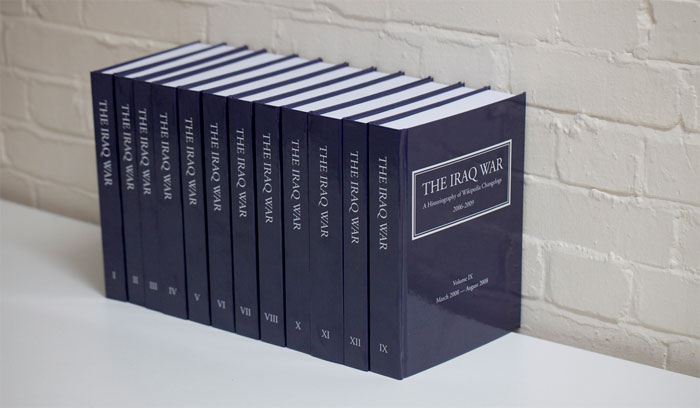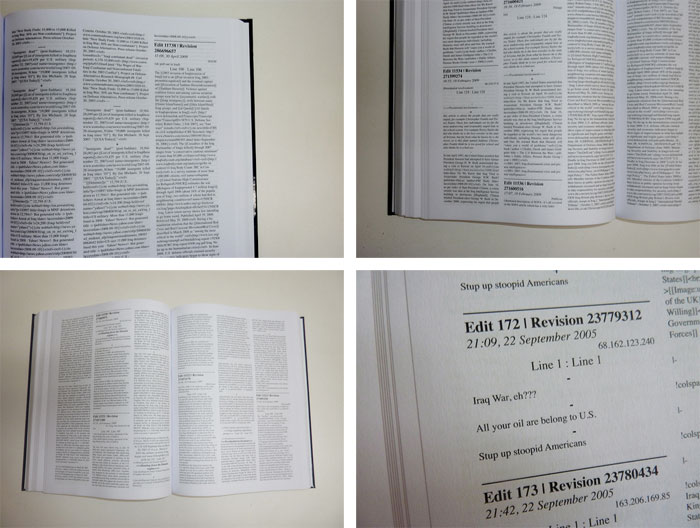In response to the ODI call for Data-Driven Art Proposals:
I propose, for the Open Data Institute, to produce a set of books visualising the results of Freedom of Information requests.
When we talk about open data, it’s often hard to understand its value as information, the range of information available, and the sheer quantity that exists. This difficulty is one we encounter regularly in modern life, and it is a symptom of our technologies: powerful and useful as they are, they are often vast, unknowable, and illegible to individuals. It has parallels in our governmental and legal structures too: inequalities of power are often preserved not through force or coercion, but through obfuscation and obscuration.
One concern of open data is transparency and social value. By unlocking previously withheld information, we produce a more active and involved society, and a healthier, more participatory democracy.
Since the implementation of the Freedom of Information Act in 2005, UK citizens have been able to request information from government departments, public authorities and municipal and state bodies. This is a laborious and time consuming process, involving written letters, formal processes, and defined timeframes and requirements. It is the opposite of perceived notions of open data: free-flowing, digital, expansive, intangible. And yet, because of exactly this weight and human scale, it is graspable, comprehensible. This is open data as it flows between people: signed and recorded, argued over and debated.
The information released under the Freedom of Information Act is cognitive, societal data. It is data that empowers people directly: it tells us important things about our government and public authorities. It is democracy in action, while simultaneously revealing the complex negotiations and fault lines that democracy entails—just as truly open data will also reveal the rough edges of our networks and systems.
For the Open Data Institute, I propose to print a series of books containing the results of Freedom of Information requests obtained with the help of the website WhatDoTheyKnow, which assists with the filing and recording of FOI requests. WhatDoTheyKnow connects citizens to 6057 authorities and since 2008 has handled over 134,000 requests. A sampling of these will be bound in the form of archival ledgers or encyclopaedias: books of record documenting the information transferred. These books, compendiums of diverse, frequently strange or seemingly minor information which is nevertheless the data of democracy, will be available for visitors to the ODI to peruse as symbols and literal visualisations, instantiations of open information as a public good.
Production
The images below are of The Iraq War: A History of Wikipedia Changelogs, a previous project which has since been exhibited across Europe and the US. It is a visualisation of edits made to a single Wikipedia article: the data of history as it is being written. The ODI project will take a similar form: a series of bound hardback books.


For this project, the books will be collated from FOI requests in their original form. Production costs for printing the books themselves will be in the range of £500-£800, depending on the final quantity and form which will be determined in discussion with the ODI. They will be presented on an open bookshelf with reading table and chairs for the public to read and interact with, as the exhibition space permits.
About the Artist
James Bridle is a writer, artist, publisher and technologist based in London, UK. His work covers the intersection of literature, culture and technology. He has written for WIRED, ICON, Domus, Cabinet, the Atlantic and many other publications, and writes a regular column for the Observer newspaper on publishing and technology. James speaks worldwide at events including SXSW (Austin), dConstruct (Brighton), LIFT (Geneva), Web Directions (Sydney) and NEXT (Berlin).
In 2011, he coined the term “New Aesthetic”, and his ongoing research around this subject has been featured and discussed worldwide. His work, such as the Iraq War Historiography, an encyclopaedia of Wikipedia Changelogs, has been exhibited at galleries in the US, Europe and Asia, and has been commissioned by organisations including Artangel and Mu, Eindhoven.
In 2012 he was a Happenstance resident at Lighthouse Gallery, Brighton, lectured as part of the 4 Thought series on BBC Radio 4, contributed to the Istanbul Design Biennial and Guimaraes 2012 European City of Culture, and was adjunct professor on the Interactive Telecommunications Programme at New York University.
A full portfolio is available online, as well as a list of talks with links on this site.
Comments are closed. Feel free to email if you have something to say, or leave a trackback from your own site.